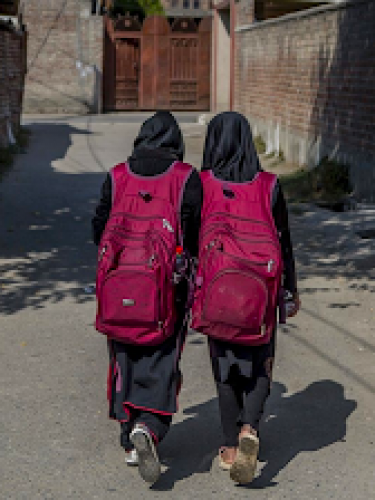
The Human Rights Institute (HRI) works to advance social and economic rights in the Central African Republic, Kashmir, and Yemen. We fight for lasting peace in these regions and strive to ensure their governments secure the rights to education, health, food, water, and sanitation. We work with our partners to achieve these goals through community- and partner-led research, advocacy, and peacebuilding initiatives.
Education and Peacebuilding Efforts in Kashmir
Kashmir has been embroiled in an over 70-year interstate territorial dispute between India and Pakistan, and has an internal militant self-determination movement. The ongoing conflict has resulted in widespread human rights abuses and socio-economic harms, including significant disruptions to education. Although Kashmiris have been deeply impacted by the conflict, they have not been meaningfully included by India or Pakistan as stakeholders in the conflict or in peacebuilding efforts.
We work in partnership with Kashmiri university faculty and students as well as NGOs to document how the conflict impacts youth and education, and to identify and advocate for effective reform. We use participatory action research to understand the problem and steps to address it. Our collaborations, and create innovative spaces for dialogue and peacebuilding efforts, while equipping Kashmiri youth with the skills necessary to lead human rights and peacebuilding initiatives.
As a result of this work, HRI has:
-
Identified key recommendations for education reform based on the findings of the participatory research and worked in partnership with Kashmiri universities to implement them.
-
Created spaces and a network for peer-to-peer learning and support between Kashmiri youth and youth-led groups in other conflict-affected regions.
-
Conducted research that informed the design and implementation of community-led peacebuilding initiatives.
Discrimination of Religious Minorities and the Right to Education in the Central African Republic
The Muslim minority in the Central African Republic (CAR) is discriminated against on multiple grounds, and prevented from practicing their religion. In particular, Muslim students have been denied the education they are entitled to.. The Human Rights Clinic supports a network of Muslim NGOs called the Coordination des Organisations Musulmanes de Centrafrique (COMUC) to document violations against freedom of religion, conduct advocacy before international bodies, and engage in inter-religious dialogue and exchanges. Additionally, the Clinic supports CAR university students who founded the NGO Collectif des Étudiants Musulmans Centrafricains (CEMUC) to create a multiyear learning exchange to develop human rights advocacy skills, including how to examine the effects of conflict and discrimination on the right to education, how to document discrimination, and how to advocate for the right to education. As a result of this partnership, HRI and the Human Rights Clinic have:
-
Hosted a member of COMUC and CEMUC, Abdoul Aziz Sali, as a practitioner-in-residence, and helped him to prepare for a presentation to the UN Security Council and the UN Secretary General
-
Accompanied COMUC to document violations resulting from post-electoral violence, focusing on discrimination of and arbitrary detention of Muslims.
-
Prepared a guide on human rights and international law norms, as well as factfinding for local advocates.
-
Researched discrimination on the basis of religion and helped Muslim students design a survey and analyze results, as well as hold multiple focus group interviews in Bangui with Muslim students to shape policy recommendations.
-
Conducted joint UN advocacy to improve the right to education, with a focus on the UN Human Rights Council.
Socioeconomic Rights in Yemen
For years, humanitarian agencies have described Yemen as the world’s largest humanitarian crisis. Millions of Yemenis suffer malnutrition, potential famine, and preventable diseases; lack access to clean water; are denied education; and struggle to access basic health care—all amid a failing economy. The Human Rights Clinic works closely with NGOs on the ground to demand these basic rights, and advance accountability for the failure to protect them.
In collaboration with Mwatana for Human Rights, the Human Rights Clinic highlights ongoing violations of basic economic and social rights, and seeks to hold the Yemeni government accountable for its failure to meet the needs of its citizens during the ongoing conflict. Our work also includes a specific focus on mental health.
With Yemeni advocates and researchers, HRI has:
-
Documented and presented on the widespread violations of the rights to food, health, education, water, and sanitation to the UN Committee on Economic, Social and Cultural Rights.
-
Analyzed the right to food during conflict, drawing from other conflict situations, and conducted a capacity-building workshop on human rights research and documentation strategies for armed conflict settings.
The Clinic and our partners advanced our shared understanding of socioeconomic rights in conflict, and in particular, pathways to accountability for a government’s failure to uphold them. The Committee’s final questions to the Yemeni government included many of our suggestions.

